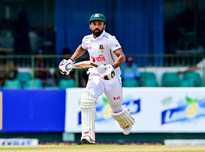Greg Chappell Lauds Rishabh Pant's Game-Changing Innings Against England
Former India coach Greg Chappell has showered praise on Rishabh Pant following the wicketkeeper-batter's remarkable centuries at Headingley. Chappell hailed Pant as a game-changer, drawing comparisons between his impact and that of Australian legend Adam Gilchrist.

Rishabh Pant celebrates a century against England.
Pant, who now serves as India's Test vice-captain, achieved a rare feat by becoming only the second wicketkeeper-batter, after Zimbabwe’s Andy Flower, to score a century in each innings of a Test match. His explosive batting display was a major highlight of the series opener at Headingley, even though India ultimately suffered a five-wicket defeat against the hosts on Day 5.
"The beauty of it (Pant’s batting) is that he gets his runs at a very fast rate, which gives you time to win cricket matches. It was a phenomenal performance; some of the shots that he played probably weren’t in the MCC coaching manual when I last looked at it," Chappell remarked at an event in Mumbai.
Chappell believes that Pant is revolutionizing Test batting with his fearless approach, capitalizing on modern bats and his innate flair.
"He is reinventing the game as a batter. You know, modern technology, the bats are very different. You can play shots that weren’t possible with the old bats. But man, he’s exciting to watch," he added.
Pant's unpredictable nature also captivated Chappell. “You never quite know what to expect from the first ball at any stage. He’s likely to jump down the wicket to the pacers, or he’ll play the falling ramp shot. You never quite know what to expect, so it keeps the opposition on their toes,” he explained.
Recalling his initial impressions of the left-hander, Chappell stated, “When I first saw him, he was a different sort of player, of course, but he reminded me very much of Adam Gilchrist.”
Pant’s twin centuries have propelled him to a career-best seventh position in the ICC Test rankings for batters. India aims to leverage his explosive form in the second Test.
Newer articles
 Chess Star Praggnanandhaa Weighs In on Carlsen's Frustration After Loss to Gukesh
Chess Star Praggnanandhaa Weighs In on Carlsen's Frustration After Loss to Gukesh
 Samsung Galaxy A35 5G and A55 5G: Official Pricing and Availability Announced
Samsung Galaxy A35 5G and A55 5G: Official Pricing and Availability Announced
 India's Fielding Woes Blamed for First Test Defeat Against England: Former Selector Voices Concerns
India's Fielding Woes Blamed for First Test Defeat Against England: Former Selector Voices Concerns
 Headline: Viral Optical Illusion: Can You Find All the Hidden Animals? Only 1% Succeed
Headline: Viral Optical Illusion: Can You Find All the Hidden Animals? Only 1% Succeed
 Shadman Stands By Bangladesh Batters After Day 1 Struggles Against Sri Lanka
Shadman Stands By Bangladesh Batters After Day 1 Struggles Against Sri Lanka
 Norris Claims Thrilling Austrian GP Victory After Intense Duel with McLaren Teammate Piastri
Norris Claims Thrilling Austrian GP Victory After Intense Duel with McLaren Teammate Piastri
 Jake Paul's Title Dreams: Analyzing Championship Prospects and Potential Opponents
Jake Paul's Title Dreams: Analyzing Championship Prospects and Potential Opponents
 Gavaskar Urges India to Unleash Kuldeep Yadav in Second Test Amid Bumrah Fitness Concerns
Gavaskar Urges India to Unleash Kuldeep Yadav in Second Test Amid Bumrah Fitness Concerns
 iQoo Z9 Turbo Leaks: Snapdragon 8s Gen 3, 1.5K Display, and Massive Battery Detailed
iQoo Z9 Turbo Leaks: Snapdragon 8s Gen 3, 1.5K Display, and Massive Battery Detailed
 Mirabai Chanu Reveals Relentless Dedication: Training and Weight Always Top of Mind, Even During Family Time
Mirabai Chanu Reveals Relentless Dedication: Training and Weight Always Top of Mind, Even During Family Time